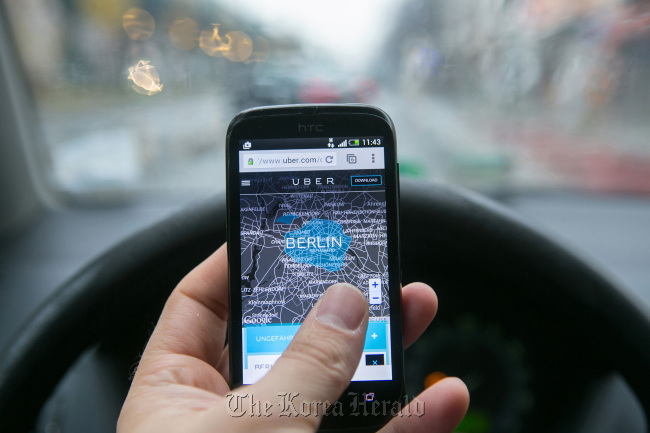Prosecutors in South Korea charged Uber Technologies Inc. Chief Executive Officer Travis Kalanick and the head of its domestic business partner MK Korea Co. with violating a transportation law.
San Francisco-based Uber is facing growing legal challenges as it expands in Asia amid mounting protest from taxi operators. Seoul Metropolitan Government said this year it may ban Uber’s service and similar applications on grounds they’re unsafe and compete with licensed taxi services, and from next week will offer rewards of as much as 1 million won ($905) to people who provide information on Uber’s services.
Uber’s South Korea unit and MK Korea illegally operated rental cars as taxis, an official with the Seoul Central District Prosecutors’ Office said by phone today, asking not to be identified, citing internal policy. The official declined to comment on whether prosecutors expect Kalanick to appear for questioning. Evelyn Tay, a spokeswoman for Uber, didn’t answer two calls to her office and didn’t immediately respond to an e-mailed request for comment on the indictment, which was reported earlier by Yonhap News.
 |
A HTC Corp. smartphone displays a city map of Berlin in the driver`s seat of an automobile in this photo dated Nov. 24. (Bloomberg-Yonhap) |
Uber, which raised $1.2 billion earlier this month at a valuation of $40 billion, said in August it had sought a legal opinion and that its Seoul service obeys the law. Opposition to its operations is down to outdated regulations that precede smartphone and wireless technology, Allen Penn, the company’s head of Asia, told reporters at the time.
Paid transportation with unregistered vehicles is “clearly illegal activity,” South Korea’s Ministry of Land, Infrastructure and Transport said later that month.
The maximum penalty for Uber’s alleged legal violation is a two-year prison sentence or a fine of as much as 20 million won, Yonhap reported today.
Uber, which according to its website operates in 53 countries, started its service in Seoul in 2013. It competes with local taxi-hailing apps such as NaviCall, run by a unit of the nation’s largest mobile phone carrier SK Telecom Co., which connects users with registered taxis.
Seoul’s government has said it will launch its own smartphone-based cab-hailing service using taxi operators.
Last week, Uber’s services were declared illegal in Taiwan. In addition to worries over the safety of consumers following reports of rape in New Delhi and Boston, Taiwan officials are concerned about how Uber collects and manages personal data including name, credit card, location and route, the Minister of Transportation and Communications Yeh Kuang-shih said in an interview. (Bloomberg)






![[Exclusive] Hyundai Mobis eyes closer ties with BYD](http://res.heraldm.com/phpwas/restmb_idxmake.php?idx=644&simg=/content/image/2024/11/25/20241125050044_0.jpg)
![[Herald Interview] 'Trump will use tariffs as first line of defense for American manufacturing'](http://res.heraldm.com/phpwas/restmb_idxmake.php?idx=644&simg=/content/image/2024/11/26/20241126050017_0.jpg)
![[Herald Review] 'Gangnam B-Side' combines social realism with masterful suspense, performance](http://res.heraldm.com/phpwas/restmb_idxmake.php?idx=644&simg=/content/image/2024/11/25/20241125050072_0.jpg)